Unit 1 Globalization
体验商务英语3 unit1Globalization
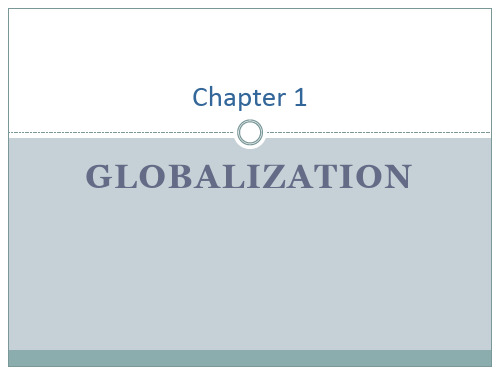
Examples: World Trade Organization (WTO)
World Bank, International Monetary Fund (IMF), United Nations (UN)
1-9
Drivers of Globalization
Question: What factors drive the move toward greater globalization?
1Байду номын сангаас12
Declining Trade and Investment Barriers
Lower trade barriers enable companies to view the
world as a single market and establish production activities in optimal locations around the globe This has led to an acceleration in the volume of world trade and investment since the early 1980s
Chapter 1
GLOBALIZATION
Chapter Objectives
1. Understand the term of globalization 2. Understand the main drivers of globalization 3. Understand the changing nature of the global
1-6
The Globalization of Markets
The globalization of markets refers to the
unit 1 globalization
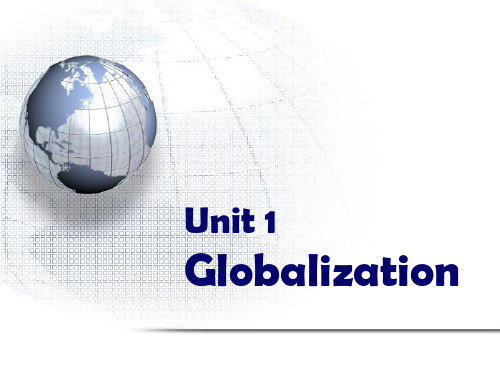
Globalization
Starting up
• What do you think globalization mean? Give examples of signs of globalization that you observed. • How do you see globalization? Do you consider it beneficial or harmful?
Licensing vs. Franchising
Licensing
• Licensing is the transfer of intellectual property from a licenser to a licensee. The property licensed might include patents, trademarks, copyrights, technology, technical know-how, or specific business skills.
• Paragraph 5
– What did Condit mean by saying making Boeing a “global enterprise”? – Why did he think BP and Shell are real global companies?
• Paragraph 6
– What did Condit expect about Boeing in 20 years?
Entering new markets
Starting up
• If you were the CEO of a company, and your company is planning to expand internationally for the first time. What can you do to enter into foreign markets?
研究生英语Lesson 1 课文Globalization

Lesson 1 GlobalizationText A Living Between Three Worlds Globalization, for better or for worse, has changed the world greatly. Though still in its early stage, it is all but unstoppable. The challenge that people face nowadays is learning how to live with it, manage it and take advantage of the benefits it offers.Many people believe that, because of globalization, productivity throughout the world will be boosted and, as the world becomes richer and more prosperous, living standards everywhere have the potential to rise. However, there are still a lot of naysayers who take the opposite view, claiming that globalization will have increasingly devastating effects on our lives. Both sides can point to ample examples to support their cases. But in the end, both are probably exaggerating to some extent. What is irrefutable is that the world economic pie is indeed becoming bigger because of globalization – and it is being sliced differently than before.As a matter of fact, globalization means different things to different people, especially when it comes to touchy issues like jobs outsourcing or immigration. Globalization may create more jobs than it actually destroys, but they are in different sectors and in different geographic regions. In today’s world, it takes more skills, education and mobility to be employable.In the following, Sujan Pandit, an Indian writing from Calcutta, describes how he is caught between several tectonic shifts in the global labor market. He also explores how his unique situation gives him choices afforded to few other Indians.My fate is not that of a corporate foot-soldier, which – as the television images and newspaper photographs would suggest – involves a life of labor in a little cell and in tandem with many other, equally industrious honey-bees, armed only with a workstation and telephone.My job in marketing and business development does not eschew face-to-face contact. The company I work for is a small one, but it is spaced over three time zones: in Dallas, New York and Calcutta.But what makes the company distinctive is that it is a post-modern firm, since such a firm could scarcely have existed ten years ago. It is what Manuel Castells – Professor of City and Regional Planning at the University of California, Berkeley – would have called a network company, held together through e-mails and teleconferences alone.Stepping out of the air-conditioned office, I am greeted with the hot, damp touch of a Calcutta dusk. I hailed a black and yellow boneshaker of a taxi and instruct the driver to head for my club.His is an old Ambassador car, a poor Morris Oxford imitation dating back to the 1950s and still unchanged – a veritable monument of the pre-globalization License Raj era.As the taxi makes its way through the hustle and bustle of Calcutta’s streets, the blaring music and garish film posters, dodging cows and errant rickshaw pullers, I meditate on the scene around me.What a contrast between the work I do and the lives they lead! What does globalization mean to these people? If globalization has to mean anything significant to the Indian poor, it must mean a transformation of their lives.And yet, I can bet 100 to one that their lives will differ in no significant way from their fathers’ or grandfathers’ before them. The only consolation I can offer myself is that my job makes me the avant-garde of a movement which may – over the course of this century – improve their great-grandchildren’s lives.Finally, the taxi reaches the club and an old Victorian clubhouse comes into view amidst the sprawling golf course, manicured lawns and tennis courts. I head for the tea-lounge.With its Daniels’ water-color prints, richly brocaded chairs, dark mahogany paneling and wooden parquetry, this is the place to enjoy coffee after work. A liveried waiter brings me some.The club itself is a product of that last great age of globalization, what Eric Hobsbawm called “The Age of Empire”. Now that we are in another age of globalization, little of the décor seems to have changed since then.Only then, as an Indian, I would not have been allowed to enter its hallowed portals. Perhaps some thing do change after all!Sipping my coffee, I ponder over the question that is being debated in England: “Import workers or export jobs?” The first thing that strikes me is that it presents a so very First World perspective.Sitting in a Third World country, the proposition could equally be phrased as: “Export workers – or import jobs?” Actually, whichever way you state it, the economist’s answer is the same and is very simple: it does not matter.As a graduate student of economics, I have imbibed the theorems of microeconomics almost with my mother’s milk. If we view the right to work and citizenship as a bundle of legal rights, then their free exchange will move resources to their highest valued use, thereby maximizing global output.Under such conditions, migration and outsourcing are two sides of the same coin, temporary disequilibrium conditions leading to an eventual equilibrium.An admirable goal? Indeed! Realizable? It will founder on the frailties of human nature. Equal real wages for equivalent work throughout the world is the most heart-warming as long as it doesn’t affect my own lifestyle. Equality is good so long that I am immune from its pressures.By a strange quirk of fate, I am condemned to view the problems of migration and outsourcing from both sides.As a child of an Indian father and English mother, I have Indian citizenship, but also a Right of Abode which allows me to work in the United Kingdom. At the same time, I am an applicant for a U.S. Green Card.Much of my high education occurred in the United States and I have worked in Indian , the U.K. and the United States. A real citizen of one country, I remain an imaginary citizen of two others.Trapped between three worlds, I feel justifiably proud at India’s success in outsourcing. Yet I am equally aware that as a potential migrant to the U.K. or the United States, the reduction in transaction costs that makes outsourcing possible has an infringing consequence: It also reduces the economic attractiveness of these two countries to me.Once we become members of an exclusive club ( like the one I am sitting in ), we would like all further applications stopped!It is this duality of human nature that makes me view the future of globalization with foreboding. Just as the last great age of globalization engendered uncontrolled jingoism and came crashing down amidst the mud and filth of Flanders’ fields, our age too has its weaknesses.Foremost among them is protectionism, which includes eliminating immigration. Equality of real wages of equivalent work is going to hit some people in the developed world really hard – and for reasons not of their own making.Before Industrial Revolution, poverty was equally distributed throughout the globe, and therefore global inequality was low.Certainly, great differences existed between king and peasant in all feudal societies, but the lot of peasant in India and Europe was fairly similar: a life at the margin.Then came the Industrial Revolution – and a few countries began to pull away from the rest. This secular separation has gone on for over two centuries now.It has reached a point where the average bachelor’ degree holder in India has to make do on a few dollars a day, while his U.S. counterpart with a similar educational level enjoys a three-bedroom house, even if both are doing the same work.The reason why this could go on was because, for the U.S. worker, the labor market he or she had to face was the local, or at best, the national market. The fall in transaction costs owing to globalization has meant that the relevant market for this worker is now the international one.This dramatic outward shift of the labor supply curve will naturally reduce his wages. At the same time, it reduces global inequality in remuneration for similar work. Both migration and outsourcing can be viewed as an attempt to arbitrage these existing wage differentials.This will certainly lead to a backlash, as is happening in the United States and Europe right now. Nor will it go away easily, not even with a return to economic prosperity.This is because of the fundamental contradiction that lies at the heart of the liberal political and economic order. The liberal economic order demands progression towards perfect competition, which ultimately devalues citizenship rights. On the other hand, the liberal political order is predicated by the concert of nation-states.We have, so far, no other bases for the establishment of democratic regimes —and the E.U. is still too immature and unloved to take its place that demands robust citizenship rights.The economic entrepreneur is expected follow the demands and needs of the consumers slavishly, but if the political entrepreneur —that is, the politician —were to follow this advice, a protectionist regime could easily emerge. After all, demand for protection is a natural reaction to declining or stagnant income levels.There is no easy way out of this dilemma and only a good dose of common-sense and self-restraint can alleviate matters.Complex thoughts. Weighty matters. And no resolution. Having finished my coffee, I take my leave from the tea-lounge and wait in the foyer for a taxi.As I scan the darkness outsides, I think of my lawyer back in Dallas and mutter, “When will my Green Card come?”。
高级商务英语听说(第二版)Unit 1 Globalization Trend[精]
![高级商务英语听说(第二版)Unit 1 Globalization Trend[精]](https://img.taocdn.com/s3/m/c0056e17a26925c52dc5bf20.png)
suddenly or completely 3. riot 暴乱;骚乱 riot wild or violent disturbance
by a crowd of people 4. tear gas 催泪瓦斯 5. Seattle 西雅图(美国华盛顿州的城市) 6. diplomat 外交官 diplomat person in the
University of International Business and Economics
People’s perception:
Pros: globalization indeed helps reduce poverty and inequality; significant decrease in the number of the world’s extreme poor since 1980; views of globalization are distinctly more positive in lowincome countries than in rich ones; developing country people blamed their local governments, not globalization, for their country’s ills.
15. Kyoto accord 京都议定书
16. The Kyoto accord also called Kyoto Protocol aims to curb the air pollution blamed for global warming. The accord requires countries to cut emissions of carbon dioxide and other greenhouse gases. Kyoto Protocol was adopted in Kyoto, Japan, on 11 December 1997.
Unit 1 Globalization

Unit 1 GlobalizationWarmer--Brief introduction (questions for discussion)1.Do you still remember the question that we discussed in last unit “whetherinternational companies can help the world economy develop or not?".●Pro-globalisers: get the developing countries onto the developing ladder●Anit-globalisers: take the advantage of developing countries, damage theenvironment of developing countries.2.Do you know how (why) the world becomes more globalizational?●travel ( since the new continent was discovered)●transportation (train, ship, and plane)●war (two great world wars)●internet●telecommunication●culture exchange3.The contributors to business globalizationThe economist has identifies these key contributors to business globalization:●free movement of capital: this is the fuel of investment in all its forms.●Trade liberation: with the lowing of trade barriers●Lowing of shipping costs: thanks to the efficiency of containerization●Reduction in telecommunications and computing costs : organizations withthe resources and expertise to exploit the information on their networks on a worldwide industries. Operating in and producing for not just one country, or even one continent, allows a company to reduce costs and benefits from economies of scale.4.Would you like to work in global companies or domestic companies?Each has two sides: advantages and disadvantagesSyndrome of international●Resistance to idea globalization (for or anti-globalization)●Subsidiaries in many counties (cross-cultural issues, potentialmisunderstandings, loss of jobs and loss of a sense of security)●Developing international team of managers in environment like these is achallenge.--Draw two circles on the board. In one write the names of the following five global companies: Suchard, McDonal’s Smithline Beecham, Pepsi, Timberland. In the other write the names of five domestic companies operating in the same product areas (i.e. confectionery, fast-food restaurants, toiletries, soft drinks, clothing).--Give SS a few minutes to think about the link between the two circles (companies operating in the dame product areas) and within each circle (global companies VS domestic companies) individually, then compare their ideas in pairs and add more names to each circle if they can.--Elicit ideas from the whole class.Overview--T ell the SS that they will be studying language associated with globalization.--Ask the SS to read the overview section, then tell them the agenda for the lesson of this unit.Quotation--Write the Quotation on the board.--Ask SS to discuss it.“We are not a global business. We are a collection of local business with intense global coordination”Percy Barnevik, Swedish business leaderThat company X responds to local needs with local solutions, but nonetheless has a general global strategy and a global communication system which keeps everyone pulling in the dame direction.Starting up●These questions introduce the theme of globalization and provide an opportunityfor some speaking practice.--Divide the class into groups of three or four Ss--Ask the SS to work through the questions--Run through the questions briefly with the whole classListening: For or against globalization●Stephen Haseler, Professor of Government at London Guildhall University, haswritten books on British and European politics, and on globalization. In this section he describes how it disempowers locals (i.e. national) governments, and suggests that large multinationals are now more powerful than some governments.Exercises pre-teach vocabulary from the interview and focus on listing for information and for understanding.●Task A--SS work through the exercise individually, checking their answers with whole class.●Task B-- Tell SS to read the two questions then play the recording once or twice.--Go through the answers with the whole class●Task C– Ask SS to do the exercise, then elicit the answersReading 1: Going global●This is article talks about the attempts by Boeing to break down a parochialcompany culture in favor of a more global view, accompanied by a more international way of doing business.●Task A--vocabulary--With book closed, write the three pre-reading questions on the board or dictate them to Ss.--Get S S to discuss the three questions.●Task B--Tell the SS to find the answers.--Go through the answers with the whole class.●Task C--SS check and/ or complete their answers by reading the text again and underlining the passage which support their answers.-- Go through the answers with the whole class.Vocabulary: Entering new markets●In this section, Ss study key words and vocabulary associated with companiesjoining forces.●Task A--Ask the SS to do this exercise individually.--Go through the answers with the whole class.●Task B--Ask the SS to do the exercise individually.--Elicit the answers to the whole class.Language review: Comparing●In this section, SS revise and practice using the comparative and superlativeforms of adjectives.--Books closed, tell Ss they are going to study the language of comparing and ask them what they understand by that. Briefly elicit some examples from everyday business life where comparing might be necessary (e.g. figures-this year’s products/ last year’s products; products-own range/ competitors’range) and some of the language that might be used to do this.--Tell SS to open their books and give them a few moments to read through and complete the language check box individually. Check the answers with the whole class.●Task A--SS work through the exercise individually, checking the answers then they’vefinished.●Task B--SS listen once or twice and mark their partner’s answers.●Task C--SS work through the exercise individually, comparing answers in pairs when theyfinished, then check the answers with the whole class.Reading 2: Phone rage●This article is about how and why people lose their temper on the phone, andsuggests that telephone training is a neglected area in business. Ss extract information and discuss guidelines for using the telephone.●Task A--Ask SS to read the three pre-reading questions in the book.--Get the SS to discuss the three questions.--Ask some pairs to report on their answers to the first two questions. When you get to the third question, write the answers on the board.●Task B--Get the SS to read the comprehension questions, try to find the answers.--Go through the answers with the whole class.●Task C-DSkills: Managing telephone calls●SS study and practice the language and skills involved in managing successfultelephone calls. A final role play provides an opportunity to put into practice everything they have learned.--SS listen ton the five conversations once or twice, matching them to the relevant adjectives.--Explore ideas on the importance of intonation with the whole class (in the absence of facial and other communicative gestures, intonation plays a key role in telephonecommunication)●Task D--Give SS time to read their role cards and act the role.Case study: Fortune Garments●This case study concerns problems of quality control, coordination and humanrelations in an international clothing business. Ss discuss and agree an action plan.Background information--Put the following table on the board.Discussion document--With books closed, write the following on the board:Problems: 1 Quality control2. responding to customer needs3, designA consultant’s report--Tell SS to read through the consultant’s report on page 13 and find out which apply to management and which to factory workers and administrative staff.Task for SS--Get SS to read the task, divide them into groups.--encourage them to draw on the language and skills they have learned in this unit to discuss.--When SS have finished, get different groups to report back to the rest of the class on their discussion and recommendations.Internet Resources1.For a brief overview of Boeing and links to articles, check out the entry in Hoover's Directory. For fuller information, check out Boeing's website.2.BP Amoco (now BP) and Royal Dutch/Shell are both cited as examples of truly global companies. Within the Shell site, you'll find a useful page about its approach to globalisation., Encyclopaedia Britannica's website, has links to several interesting articles and websites that focus on globalisation.4.Designed for entrepreneurs, the Entreworld site provides practical introductory information on a variety of business and management topics. A section on Global Entrepreneurship contains a couple of useful articles on the advantages for small businesses of expanding internationally. Check out Emerging markets: An entrepreneur's guide to staying sane, and Expanding internationally: Grow as you go. Both articles provide clear, accessible information and highlight key vocabulary.。
高级综合商务英语1彭青龙Unit1Globalization专题培训课件

Part I Questions about Part I
Q1. What is the main idea of part one (Para. 13)?
In part one, the author talks about the history of development of multinational companies and then introduces their latest movement, which is to expand rapidly, especially in those emerging markets.
Lead-in
• Globalization brings trade cபைடு நூலகம்nflicts.
Lead-in
Cultural Identity
• With different cultures around the world beginning to interact, our cultural identity is changed gradually through globalization.
Outsourcing, while it provides jobs to a population in one country, takes away those jobs from another country, leaving many persons without opportunities.
1. Lead-in 2. Text A: The Empire Strikes Back 3. Text B: Disney Theme Park
A Normal Day
• Maybe your coat could have very well been made with Chinese cotton sewed by Thai hands, shipped across the Pacific on a French freighter crewed by Spaniards to Shanghai harbor. This international exchange is becoming increasingly popular.
研究生英语综合教程unit 1 答案
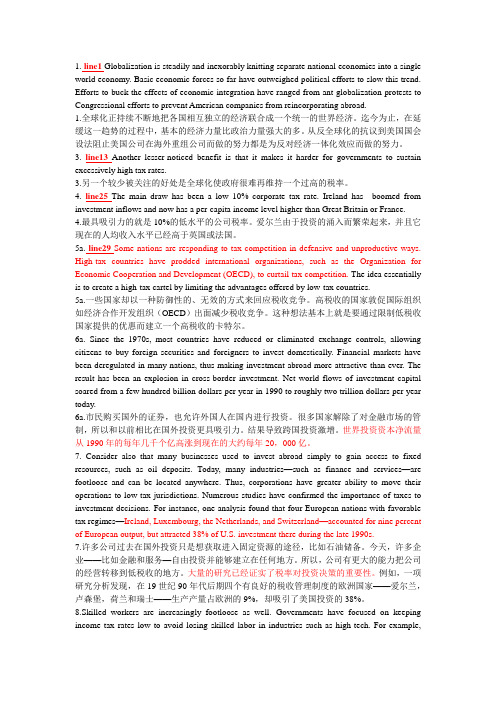
1. line1 Globalization is steadily and inexorably knitting separate national economies into a single world economy. Basic economic forces so far have outweighed political efforts to slow this trend. Efforts to buck the effects of economic integration have ranged from ant-globalization protests to Congressional efforts to prevent American companies from reincorporating abroad.1.全球化正持续不断地把各国相互独立的经济联合成一个统一的世界经济。
迄今为止,在延缓这一趋势的过程中,基本的经济力量比政治力量强大的多。
从反全球化的抗议到美国国会设法阻止美国公司在海外重组公司而做的努力都是为反对经济一体化效应而做的努力。
3. line13 Another lesser-noticed benefit is that it makes it harder for governments to sustain excessively high tax rates.3.另一个较少被关注的好处是全球化使政府很难再维持一个过高的税率。
4. line25 The main draw has been a low 10% corporate tax rate. Ireland has boomed from investment inflows and now has a per-capita income level higher than Great Britain or France.4.最具吸引力的就是10%的低水平的公司税率。
高级综合商务英语1 彭青龙 Unit 1 Globalization

Part I Questions about Part I
Q 2. When people talking about emerging market, what are the countries or regions that they are referring to? (Para. 1)
Emerging markets are nations with social or business activity in the process of rapid growth and industrialization. The seven largest emerging and developing economies are the BRIC countries (, Brazil, Russia, India and China), as well as Mexico, Indonesia, and Turkey.
• Global competition encourages creativity and innovation and keeps prices for commodities/services in check.
Keep ..in check 使..受抑制、约束
Lead-in
• Globalization changes our employment.
• Mobile phones have surpassed their original use.
------Steve ·Jobs
(February 24, 1955 – October 5, 2011)
Lon changes our ways of thinking.
Outsourcing, while it provides jobs to a population in one country, takes away those jobs from another country, leaving many persons without opportunities.
体验商务英语3 unit1Globalization

1. Converging tastes and preferences of consumers in different nations Q: Impacts on American businesses? 2. Examples of global brands: Coca Cola, Starbucks, Sony, and McDonald’s
1-13
The Role of Technological Change
The lowering of trade barriers made globalization
of markets and production a theoretical possibility, technological change made it a tangible reality Since World War II, there have been major advances in communication, information processing, and transportation1-4来自Introduction
The effects of this trend can be seen in the following Examples in our daily life: in the cars people drive in the food people eat in the jobs where people work in the clothes people wear in many other ways
1-6
The Globalization of Markets
The globalization of markets refers to the
新技能英语高级教程1单词表
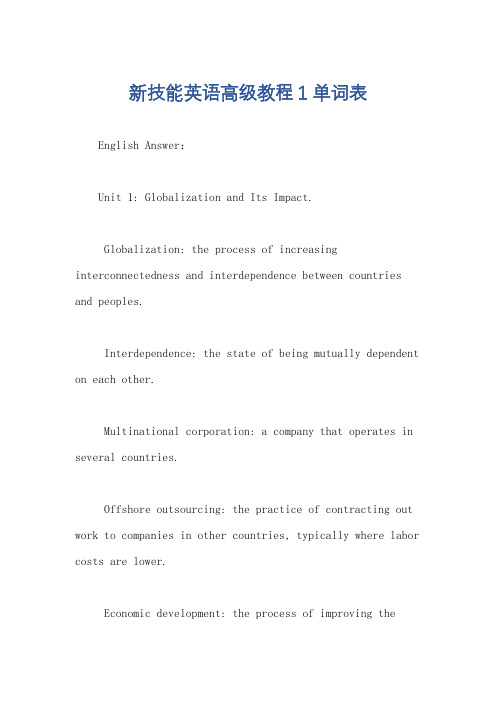
新技能英语高级教程1单词表English Answer:Unit 1: Globalization and Its Impact.Globalization: the process of increasing interconnectedness and interdependence between countries and peoples.Interdependence: the state of being mutually dependent on each other.Multinational corporation: a company that operates in several countries.Offshore outsourcing: the practice of contracting out work to companies in other countries, typically where labor costs are lower.Economic development: the process of improving theeconomic well-being of a country or region.Human development: the process of expanding human capabilities and choices.Sustainable development: development that meets the needs of the present without compromising the ability of future generations to meet their own needs.Unit 2: Technological Advancements.Artificial intelligence (AI): the ability of computers to perform tasks that normally require human intelligence.Blockchain: a distributed database that is used to maintain a continuously growing list of records, called blocks.Cloud computing: the delivery of computing services over the internet.E-commerce: the buying and selling of goods orservices over the internet.Internet of Things (IoT): the network of physical devices that are connected to the internet.Machine learning: the ability of computers to learn without being explicitly programmed.Virtual reality (VR): the use of computer technology to create a simulated environment that can be experienced by the user.Unit 3: Environmental Challenges.Climate change: the long-term alteration of temperature and typical weather patterns in a place.Deforestation: the clearing of forests.Desertification: the process by which land becomes desert.Environmental degradation: the damage or destruction of the natural environment.Extinction: the dying out of a species.Global warming: the gradual increase in the average temperature of the Earth's atmosphere.Pollution: the contamination of the natural environment with harmful substances.Unit 4: Social and Cultural Changes.Cultural diversity: the variety of cultural practices and beliefs that exist in a society.Cultural identity: the sense of belonging to a particular culture.Cultural relativism: the belief that all cultures are valid and should be respected.Globalization of culture: the spread of cultural practices and beliefs across national borders.Intercultural communication: communication between people from different cultural backgrounds.Social change: the transformation of socialinstitutions and practices over time.Social inequality: the unequal distribution of resources and opportunities in a society.Unit 5: Global Health and Well-being.Access to healthcare: the ability to obtain healthcare services when needed.Communicable diseases: diseases that can be transmitted from one person to another.Global health: the health of people around the world.Health disparities: the differences in health outcomes between different groups of people.Non-communicable diseases: diseases that are not transmitted from one person to another.Public health: the science and art of preventing disease, prolonging life, and promoting health through organized efforts.Universal health coverage: the provision of health services to all people, regardless of their ability to pay.Unit 6: International Relations.Diplomacy: the conduct of international relations through negotiation and dialogue.Foreign policy: the policy of a government towards other countries.Globalization of politics: the increasinginterconnectedness and interdependence of political systems around the world.International law: the body of law that governs relations between states.International organizations: organizations that are composed of member states and that work to promote cooperation among them.National security: the protection of a country from threats to its security.War: a state of armed conflict between two or more countries.中文回答:单元 1,全球化及其影响。
高级商务英语Unit1Globalization

7th Secretary-General of the United Nations (January 1997 -- December 2006)
Quotation 2
"Globalization has changed us into a company that searches the world, not just to sell or to source, but to find intellectual capital -- the world's best talents and greatest ideas." -- Jack Welch
Globalization
Four Basic Aspects of Globalization (by IMF) trade and transactions capital and investment movements migration and movement of people dissemination of knowledge environmental challenges climate change cross-boundary water and air pollution over-fishing of the ocean
Lead-in
Warm-up Questions Quiz Quotation Mini Case
Quiz
Lead-in
Warm-up Questions Quiz Quotat"It has been said that arguing against globalization is like arguing against the laws of gravity." -- Kofi Anna
globalization课文翻译
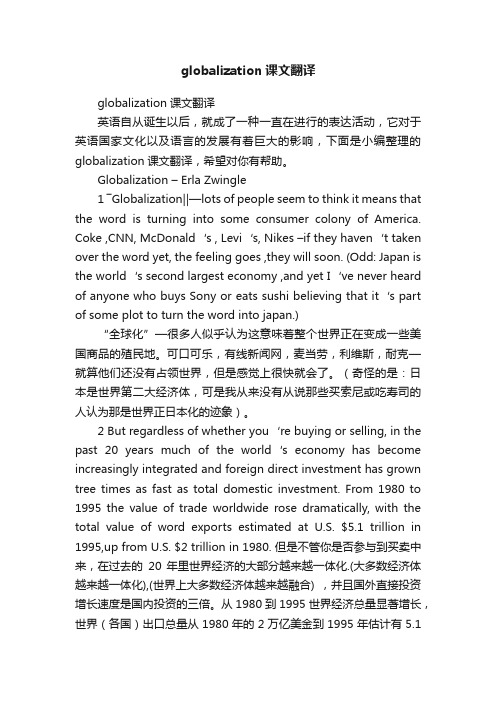
globalization课文翻译globalization课文翻译英语自从诞生以后,就成了一种一直在进行的表达活动,它对于英语国家文化以及语言的发展有着巨大的影响,下面是小编整理的globalization课文翻译,希望对你有帮助。
Globalization – Erla Zwingle1 ―Globalization‖—lots of people seem to think it means that the word is turning into some consumer colony of America. Coke ,CNN, McDonald‘s , Levi‘s, Nikes –if they haven‘t taken over the word yet, the feeling goes ,they will soon. (Odd: Japan is the world‘s second largest economy ,and yet I‘ve never heard of anyone who buys Sony or eats sushi believing that it‘s part of some plot to turn the word into japan.)“全球化”—很多人似乎认为这意味着整个世界正在变成一些美国商品的殖民地。
可口可乐,有线新闻网,麦当劳,利维斯,耐克—就算他们还没有占领世界,但是感觉上很快就会了。
(奇怪的是:日本是世界第二大经济体,可是我从来没有从说那些买索尼或吃寿司的人认为那是世界正日本化的迹象)。
2 But regardless of whether you‘re buying or selling, in the past 20 years much of the world‘s economy has become increasingly integrated and foreign direct investment has grown tree times as fast as total domestic investment. From 1980 to 1995 the value of trade worldwide rose dramatically, with the total value of word exports estimated at U.S. $5.1 trillion in 1995,up from U.S. $2 trillion in 1980. 但是不管你是否参与到买卖中来,在过去的20 年里世界经济的大部分越来越一体化.(大多数经济体越来越一体化),(世界上大多数经济体越来越融合) ,并且国外直接投资增长速度是国内投资的三倍。
Unit_1_globalization_-商务英语精品课件

Disadvantages:
Globalization could lead to big employment problems in the West. Globalization lowers people’s living standards. Globalization prevents governments from controlling their welfare systems. Globalization creates cross-cultural problems.
Different types of telecommunications way
radio telegraph television telephone data communication and computer networking
Wireless communication
---- Sam Walton The Founder of Wal-Mart
Japan & Globalisation
Toyota: --nearly the world’s biggest carmaker --changing their business & management style to respond to the race of globalisation --factories in 27 countries
Wal-Mart Global brief Apr 30, 2010
Retail Units Worldwide: 8,445 US Retail Units: 4, 364 Wal-Mart Stores-804 Supercenters-2,767 SAM’S CLUBs-605 Neighborhood Market-182 International Retail Units: 4,068 China-284 (Aug, 1996)
商务英语 Unit 1 globalisation
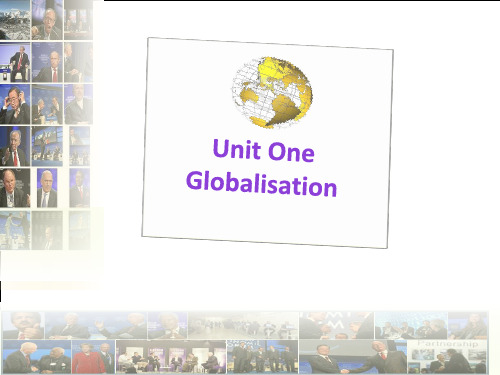
3. give-and-take(互相让步,迁就) 4. Stephen Haseler • London Guildhall university
word
1 South Africa has world-class ( ), including a modern transport system, low-cost and widely available electricity. 2 This is a big( ); we need more time to think about it. 暨南大学 3 In this article, we’ll talk about how you can increase the ( )of your business 2013-7-21 12
word
Back to overview
2013-7-21
15
Listening For and against globalization
Which of the points below does Stephen Haseler make? Advantages: Globalization increases the power of government. Globalization increases competition among companies. √ Competition will increase employment everywhere. Disadvantages: Globalization prevents governments from controlling √ their welfare systems. Globalization lowers people’s living standards. Globalization could lead to big employment problems √ in the West. Globalization creates cross-cultural problems.
高级综合商务英语--Unit-1-Globalization

• Mobile phones have surpassed their original use.
------Steve ·Jobs
Unit One
Globalization
高级综合商务英语--Unit-1Globalization
1. Lead-in 2. Text A: The Empire Strikes Back 3. Text B: Disney Theme Park
高级综合商务英语--Unit-1Globalization
Para. 814
The advantages enjoyed by big multinationals over their local rivals and the existing problems on both parts. 高级综合商务英语--Unit-1-
Globalization
Part I Questions about Part I
• There is a greater access to foreign culture in the form of movies, music, food, clothing, and more.
• In short, the world has more choices.
高级综合商务英语--Unit-1Globalization
高级综合商务英语--Unit-1Globalization
Lead-in
• Globalization brings trade conflicts.
商务英语-Unit-1-参考答案
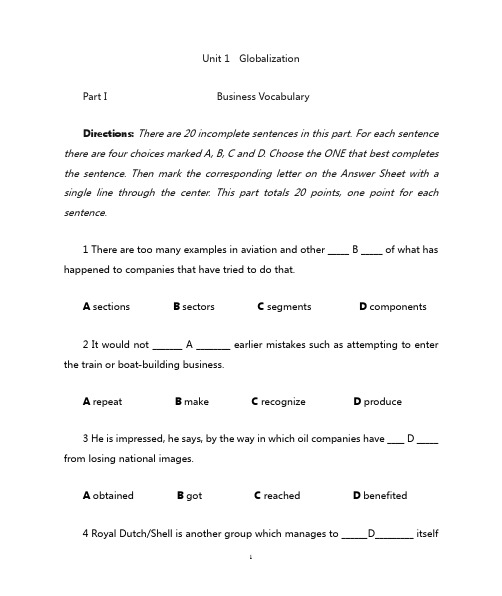
Unit 1 GlobalizationPart I Business VocabularyDirections: There are 20 incomplete sentences in this part. For each sentence there are four choices marked A, B, C and D. Choose the ONE that best completes the sentence. Then mark the corresponding letter on the Answer Sheet with a single line through the center. This part totals 20 points, one point for each sentence.1 There are too many examples in aviation and other _____ B _____ of what has happened to companies that have tried to do that.A sectionsB sectorsC segmentsD components2 It would not _______ A ________ earlier mistakes such as attempting to enter the train or boat-building business.A repeatB makeC recognizeD produce3 He is impressed, he says, by the way in which oil companies have ____ D _____ from losing national images.A obtainedB gotC reachedD benefited4 Royal Dutch/Shell is another group which manages to ______D_________ itselfas a local company in which it operates.A displayB exhibitC showD present5 When the Japanese tyre group Bridgestone entered the US market, it made an _________ C _______, buying the local production base of Firestone.A saleB purchaseC acquisitionD overpayment6 If a company wishes to enter the Chinese market, it usually looks for a local ________ D ________ who will cooperate in setting up a joint venture.A manB talentC managerD partner7 If you’re ______ C ______ don’t go to Oslo – it’s Europe’s most expensive city.A hardB hardyC hard upD hard down8 A survey has _______A_________ with some interesting information about the cost of living in our major cities.A come upB show upC put upD live up9 Meals at restaurants cost a _________ C ________ and drinks are very pricey.A expenseB priceC fortuneD fate10 Being kept waiting, being connected to voice mail or being passed on to someone else are all common ________ D _______.A flashesB firesC firecrackersD flashpoints11 Reasons for this are ________ B _________, according to Reed.A three piecesB threefoldC threeD triple12 Increasing numbers of transactions take place entirely by phone, from ___ D ____ insurance to paying bills.A doingB sellingC buyingD arranging13 As companies move towards ‘remote working’, the need for the right tone of voice _______ A _______ to every level of the organization.A extendsB stretchesC expandsD attaches14 However, globalization has brought problems in the compan y’s overseas plants, and this is having a bad ________ A _______ on its share prices.A effectB influenceC affectD consequence15 A journalist from the Eastern Economist Review suggested recently that the company could become the _______ B _______ of a takeover if it didn’t sort out its problems soon.A aimB targetC objectiveD purpose16 Although this helps to lower costs, the materials are often of poor quality. This has resulted in _______ C _______ orders.A placedB placingC cancelledD canceling17 Recently, a German distributor refused a D of 50,000 blouses.A dealB transactionC cargoD consignment18 When customers want last-minute changes to clothing, the plants cannot meet customers’ tight _______ D ______.A timesB periodsC datesD deadlines19 Its latest _______ B ______ were described by a famous fashion expert as ‘boring, behind the times and with no appeal to a fashion-conscious buyer’.A seriesB collectionsC sequencesD present20 Factory workers complain about their wages. They are often expected to work _______ C ________ without extra pay.A overB timeC overtimeD timelyPart II Phrase TranslationDirections: Directions: There are 20 Chinese phrases in this part. You are required to translate them into English and write down your translation on the Answer Sheet. This part totals 20 points, one point for each phrase.1 资本外逃fight of capital2 福利welfare benefits3 相互让步give-and-take4 国家形象national image5 航空航天公司aerospace company6 全球化公司global company7 就业问题employment problems8 生活水准living standard9 跨文化问题cross-cultural problems10 合资企业joint venture11 本地合伙人local partner12 许可协议licensing agreement13 通货膨胀率inflation rate14 市场调研market research15 远程办公remote working16 全球会议global conference17 股票价格share price18 顾客需求customers’ needs19 低价战略low-pricing strategy20 员工流动率staff turnoverPart III Sentence TranslationDirections: There are 10 sentences in this part. You are required to translate them into Chinese and write down your translation on the Answer Sheet. This part totals 20 points, two points for each sentence.1.There are too many examples in aviation and other sectors of what has happened to companies that have tried to do that.在航空业和其他行业中想要原地踏步而以失败告终的例子比比皆是2.People are much more likely to express anger over the phone, rather than in writing or face to face.和书信及面对面交流比起来,人们更容易在电话上发火。
Unit1Globalization课后习题答案
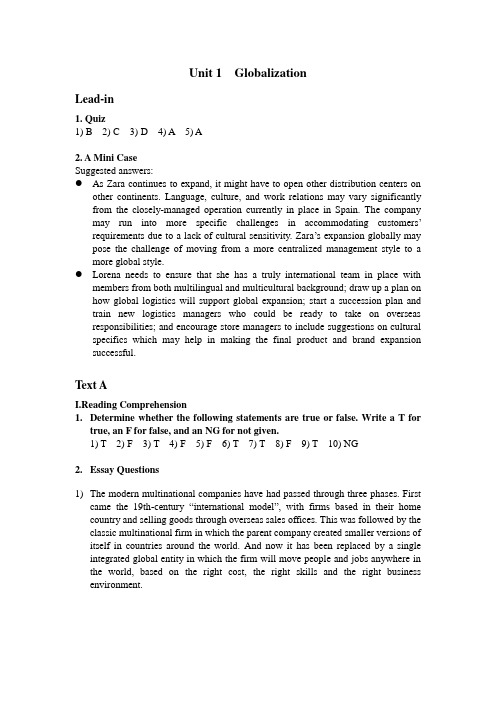
Unit 1 GlobalizationLead-in1. Quiz1) B 2) C 3) D 4) A 5) A2. A Mini CaseSuggested answers:●As Zara continues to expand, it might have to open other distribution centers onother continents. Language, culture, and work relations may vary significantly from the closely-managed operation currently in place in Spain. The company may run into more specific challenges in accommodating customers’requirements due to a lack of cultural sensitivity. Zara’s expansion globally may pose the challenge of moving from a more centralized management style to a more global style.●Lorena needs to ensure that she has a truly international team in place withmembers from both multilingual and multicultural background; draw up a plan on how global logistics will support global expansion; start a succession plan and train new logistics managers who could be ready to take on overseas responsibilities; and encourage store managers to include suggestions on cultural specifics which may help in making the final product and brand expansion successful.Text AI.Reading Comprehension1.Determine whether the following statements are true or false. Write a T fortrue, an F for false, and an NG for not given.1) T 2) F 3) T 4) F 5) F 6) T 7) T 8) F 9) T 10) NG2.Essay Questions1)The modern multinational companies have had passed through three phases. Firstcame the 19th-century “international model”, with firms based in their home country and selling goods through overseas sales offices. This was followed by the classic multinational firm in which the parent company created smaller versions of itself in countries around the world. And now it has been replaced by a single integrated global entity in which the firm will move people and jobs anywhere in the world, based on the right cost, the right skills and the right business environment.2)The big attractions from emerging markets are low-cost labor, highly skilledpersonnel, and a chance to cooperate with the government as a potential customer.3)They are lacking the management talents who can practice and support businessoperating models that will allow them to generate profitable growth in more mature markets over the long term.4)The single biggest challenge facing Western multinationals is the lack ofemerging-market experience in their senior ranks. Moreover, multinationals have great trouble retaining the managers they do have in emerging markets.“Well-trained, good, honest people are scarce in emerging markets. Multinationals are better at training these people than emerging-market companies, which prefer to poach them once they are trained.”II.Blank-filling: Complete the following sentences with the words given in the box. Change the form when necessary.1)cutting-edge2)commoditized3)aggressive4)forge5) benchmark6) blueprint7) expatriates8) deploy9) ferocious10) substantialIII.Paraphrasing1.Rewriting: Rewrite the underlined part of each sentence in your own words.1) “In the 97 years of the company’s history, never had a particular kind of product or merchandise been managed outside the U.S.,”he says excitedly, noting that “Latin America now reports to Shanghai.”2) But the assault on its services business led by a trio of Indian outsourcing upstarts, Tata Consulting Services, Infosys and Wipro, posed a big threat to the field that might be the main sources of growth for the company as expected by Mr. Palmisano.3) In many emerging markets the most attractive potential customer is the government, because of the government’s urgent needs to improve the infrastructure facilities in a wide range, from the mobile telephone networks to roads, airports and ports, energy and water supply.4) A 2007 study of China’s top 200 publicly traded companies found that it is still difficult even for the leading companies in China to compete with those global giants.5) American multinationals now have a “ferocious interest in attracting non-Americans to the board”, but they can find only a few qualified executives from the European countries, not to mention those from emerging markets.2.Sentence Transformation:1) Because of the fact that hot labor markets in emerging markets are causing extremely high turnover rates, every big multinational is aiming to win the “war for talent” and taking it as one of the most urgent issues.2) It is believed that as a big multinational company it enjoys advantages in recruiting and retaining talented managers than the local competitors.3) Despite the growth of their revenue which increased on the back of China’s continued economic growth, they could only create half of the value of their global competitors.4)No longer the “young bucks or retirement-posing types”as they used to be, nowadays the expatriate managers appointed by multinationals to work in emerging markets are generally of a much higher quality.5) Compared with those old multinationals, the firms in emerging markets are typically lacking the depth of management talent, though the founders are often impressive.IV.Translation1.Sentence Translation1) 这一雄心勃勃的策略是对来自新兴市场的激烈竞争做出的回应。
- 1、下载文档前请自行甄别文档内容的完整性,平台不提供额外的编辑、内容补充、找答案等附加服务。
- 2、"仅部分预览"的文档,不可在线预览部分如存在完整性等问题,可反馈申请退款(可完整预览的文档不适用该条件!)。
- 3、如文档侵犯您的权益,请联系客服反馈,我们会尽快为您处理(人工客服工作时间:9:00-18:30)。
Vocabulary
• acquisition n. take-over;
buying another or part of another company
• joint venture: a business
activity in which two or more companies have invested together
• The Boeing Company (1997 Boeing merged with McDonnell Douglas under the name
The Boeing Company)
• Founded: Seattle, Washington (1916) • Headquarters: Chicago, Illinois, US (September 2001 from Seattle to Chicago) • Industry: Aerospace and Defense • Products: Commercial airliners (747,787 Dreamliner…) Military aircraft( Air Force One) Munitions (军需品) Space system…
• license v. sell the right to a manufacturer’s trademark
• local partner: a person or company who cooperates with a foreign company who wishes to enter the market • subsidiary n. a company that is at least half-owned by another company
Q & A:
1. S H is generally against globalization. He thinks the advantages are ‘outweighed by a large number of disadvantages’.
2. A: 2) D: 1); 3)
Overview:
• consortium n. a combination of
several companies working together for a particular purpose
• franchise n. the exclusive right
to sell products in a certain area v. to give or sell franchises to sb.
Domestic Company
Global Company
• • • • • •
KFC Moutai Nestle Unilever Dabao BMW
Domestic Company
a) a company that is within the country of it's own origin.
Sources of Globalization:
► Internationalization of Economic Activity: Trade & Finance ► Global Liberalization: Domestic and International ► Technological Changes: IT Revolution (Speed and Cost) ► Improvements in Transportation ► Globalized Production Structures: ‘Stateless Corporations’
பைடு நூலகம்
Do global companies do more harm than good? Are you in favor of globalization or against it?
Overview:
1.1 Discussion: Globalization 1.2 Listening: For & Against Globalization 1.3 Vocabulary: Entering New Markets 1.4 Reading Ⅰ: Going Global 1.5 Reading Ⅱ: Phone Rage 1.6 Language Review: Comparing 1.7 Skills: Managing Telephone Calls 1.8 Case Study: Fortune Garments
Stephen Haseler has written books on globalization. 1) pointing out how globalization increases competition; 2) describing how globalization disempowers local governments; 3) suggesting that large multinationals are now more powerful than some governments.
Globalization (globalisation)
Core: economic globalization (the integration of national economies into the international economy through trade, foreign direct investment, capital flows, migration, and the spread of technology)
Globalization (globalisation)
• an ongoing process and a globespanning network of exchange • integration of economies, technologies, societies, and cultures, etc.
• British Petroleum plc
• the third largest global energy company • the 5th largest company in the world • UK's largest company • a multinational oil company
a) it has a general global strategy and global communication system; b) a company responds to local needs with local solutions.
global adj. globalize v. globalization n.
Effects of Globalization:
► economy: global common market (free exchange of goods & capital) ► finance: worldwide financial markets ► industry: broader access to a range of foreign products; free movement of material and goods ► culture & society: growth of crosscultural contacts & communication; greater immigration
• A joint venture (JV) is an entity formed between two or more parties to undertake economic activity together. The parties agree to create a new entity by both contributing equity, and they then share in the revenues, expenses, and control of the enterprise.
• Royal Dutch Shell plc
• Industry: Oil and gas • Products: Petroleum, natural gas, and other petrochemicals • a multinational petroleum company of Dutch and British origins
Vocabulary:
• infrastructure
• flight of capital : capital flight
• give-and-take: willingness in a relationship to accept what sb. else wants and give up some of what you want • gather pace: to increase in speed • rule the roost: to be the most powerful member of a group
• A consortium is an association of two or more individuals, companies, organizations or governments with the objective of participating in a common activity or pooling their resources for achieving a common goal.
► Globalization encompasses:
